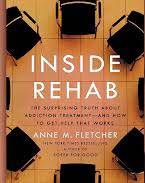Critics as Benefactors
7/19/2013
When the first serious criticisms of Alcoholics Anonymous (AA) broke into the public press in the early 1960s, many within the AA fellowship looked to AA co-founder Bill Wilson to provide a point-by-point response to the criticisms. Instead, Wilson suggested on the pages of the A.A. Grapevine (April, 1963) that criticisms of AA could be best met with public silence, internal self-reflection and, where needed, concerted self-correction. He further suggested that A.A. should offer thanks to its critics in such circumstances. I have often been reminded of Wilson's quite remarkable stance when the addiction treatment field has faced critiques of its own shortcomings.
 Anne Fletcher, in her new book Inside Rehab, offers the latest such critique of the addiction treatment field. As one who has spent nearly half a century helping build and elevate specialized addiction treatment in the United States, this was not an easy book for me to read. And one might easily respond that the author missed on this or that point or failed to understand this or that about addiction treatment and recovery. But make no mistake. This is a serious review of the state of addiction treatment in the U.S. whose intent is unquestionably one of improving the state of such care. The field would be well-served if the publication of Inside Rehab sparked a "searching and fearless" self-inventory of the field's infrastructure, business practices, clinical philosophies and clinical practices. If that should occur, the field owes Anne Fletcher not our resentments for publically exposing our vulnerabilities, but our thanks for helping improve the accessibility, affordability and quality of our services to the individuals, families and communities we serve.
Anne Fletcher, in her new book Inside Rehab, offers the latest such critique of the addiction treatment field. As one who has spent nearly half a century helping build and elevate specialized addiction treatment in the United States, this was not an easy book for me to read. And one might easily respond that the author missed on this or that point or failed to understand this or that about addiction treatment and recovery. But make no mistake. This is a serious review of the state of addiction treatment in the U.S. whose intent is unquestionably one of improving the state of such care. The field would be well-served if the publication of Inside Rehab sparked a "searching and fearless" self-inventory of the field's infrastructure, business practices, clinical philosophies and clinical practices. If that should occur, the field owes Anne Fletcher not our resentments for publically exposing our vulnerabilities, but our thanks for helping improve the accessibility, affordability and quality of our services to the individuals, families and communities we serve.
I was struck many years ago with Robin Room's suggestion that the cultural ownership of intractable problems was inherently unstable and that critics always had an edge on those currently responsible for preventing and managing such problems. Where perfect solutions can be found at the personal level for severe alcohol and other drug problems, no such perfection has ever been achieved at a societal level. Such imperfection, as Room suggests, inevitably breeds pessimism and receptiveness to the next voice claiming to possess THE answer. Addiction treatment as a major cultural institution has existed for less than a half century and remains on probationary status. That status is particularly fragile in a contemporary culture where relapsing celebrities heading back to "rehab" fill daily headlines while the masses of people in long-term recovery remain culturally invisible. Our response requires more than the ill-chosen platitude, "Treatment Works." Our future status as a field hinges on our ability to significantly elevate and extend when, where and how we respond to the whole spectrum of alcohol and other drug problems. Listening to our critics could be a critical step in achieving that.